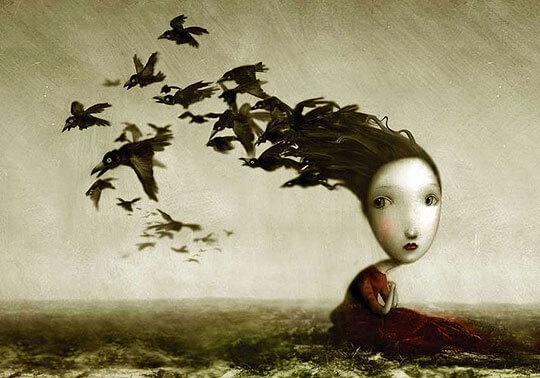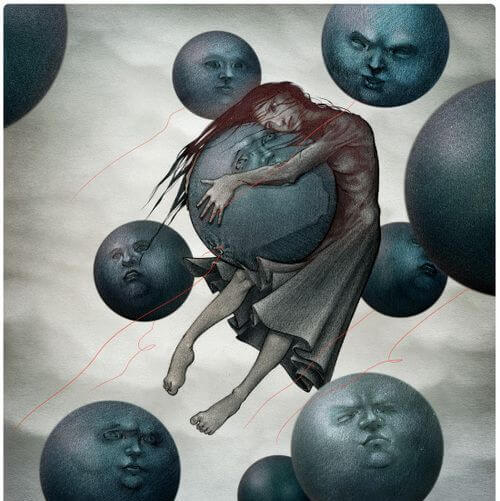Revenge Makes the Whole World Blind

Like Gandhi said, “an eye for an eye makes the whole world blind.” With nonviolence as his maxim, he spoke these words hoping there would be enough ears that were ready to listen to and understand his message. His warning about revenge is easy to understand, but difficult to apply.
People want revenge when they’ve been deeply hurt. When someone they love and appreciate hurts you, it can leave an emotional scar that burns with an intense heat, begging to be put out by inflicting another wound in the heart of the aggressor.
When you have a deep emotional wound, you might feel the need to cause similar, or even greater, harm to the person who hurt you first.
Immediate satisfaction, permanent consequences
Revenge is a failed attempted to balance the scales, since no matter how many adjustments you make, they’ll always remain unbalanced. The wounded person will feel inferior, like they’re beneath the person who hurt them, so they’ll try to hurt the other person to regain their initial position of balance or become superior.
The first emotion that tends to arise when you get revenge on someone is satisfaction and the feeling that everything has recovered its balance. However, this feeling quickly disappears and gives way to guilt and remorse. It can also feel like emptiness, like when you finish a big project, if you’ve dedicated a lot of time and resources towards planning and executing the revenge.

Even if you don’t feel remorse after getting revenge, the scales still won’t be completely balanced. The consequences of revenge can last well into the future, where the desire to cause harm disappears and sadness takes its place.
It’s impossible to predict the future and know who you’ll need by your side. Maybe the person you want to hurt today will become an important person in your life tomorrow. Remember that vengeful feelings disappear, but the damage you cause because of them can be deep and permanent.
Never again
When someone opens the first page in the book of vengeance and decides to keep going, it’s hard for the story not to escalate until the climax of the book. The intensity of each character’s actions tends to increase as the plot thickens.
Revenge lives in a country called Never Again, where the people stay young forever, and there are no rules or responsibilities.

When a problem arises between two or more people, there are a few different ways to respond: run away, attack, or solve the problem. In the case of revenge, the decision is to attack. If both people decide to utilize the same strategy, the conflict will escalate until one party decides that they’ve lost too much in the fight.
The world lacks compassion and has too much pride
In the culture of honor, where the important thing isn’t to cause harm, but to regain honor, relationships end up burning people. Feeding into vengeance by attacking others will only fuel the hate. Putting out the fire is just the first step towards letting something new rise up from the ashes.
There’s no justice in revenge.
Responding to pain with more pain doesn’t change the situation or make you feel better. Most of the time, being brave isn’t being stronger than the other person, but putting yourself in their place and deciding that you don’t want anyone else to relive that pain.
Like Gandhi said, “an eye for an eye makes the whole world blind.” With nonviolence as his maxim, he spoke these words hoping there would be enough ears that were ready to listen to and understand his message. His warning about revenge is easy to understand, but difficult to apply.
People want revenge when they’ve been deeply hurt. When someone they love and appreciate hurts you, it can leave an emotional scar that burns with an intense heat, begging to be put out by inflicting another wound in the heart of the aggressor.
When you have a deep emotional wound, you might feel the need to cause similar, or even greater, harm to the person who hurt you first.
Immediate satisfaction, permanent consequences
Revenge is a failed attempted to balance the scales, since no matter how many adjustments you make, they’ll always remain unbalanced. The wounded person will feel inferior, like they’re beneath the person who hurt them, so they’ll try to hurt the other person to regain their initial position of balance or become superior.
The first emotion that tends to arise when you get revenge on someone is satisfaction and the feeling that everything has recovered its balance. However, this feeling quickly disappears and gives way to guilt and remorse. It can also feel like emptiness, like when you finish a big project, if you’ve dedicated a lot of time and resources towards planning and executing the revenge.

Even if you don’t feel remorse after getting revenge, the scales still won’t be completely balanced. The consequences of revenge can last well into the future, where the desire to cause harm disappears and sadness takes its place.
It’s impossible to predict the future and know who you’ll need by your side. Maybe the person you want to hurt today will become an important person in your life tomorrow. Remember that vengeful feelings disappear, but the damage you cause because of them can be deep and permanent.
Never again
When someone opens the first page in the book of vengeance and decides to keep going, it’s hard for the story not to escalate until the climax of the book. The intensity of each character’s actions tends to increase as the plot thickens.
Revenge lives in a country called Never Again, where the people stay young forever, and there are no rules or responsibilities.

When a problem arises between two or more people, there are a few different ways to respond: run away, attack, or solve the problem. In the case of revenge, the decision is to attack. If both people decide to utilize the same strategy, the conflict will escalate until one party decides that they’ve lost too much in the fight.
The world lacks compassion and has too much pride
In the culture of honor, where the important thing isn’t to cause harm, but to regain honor, relationships end up burning people. Feeding into vengeance by attacking others will only fuel the hate. Putting out the fire is just the first step towards letting something new rise up from the ashes.
There’s no justice in revenge.
Responding to pain with more pain doesn’t change the situation or make you feel better. Most of the time, being brave isn’t being stronger than the other person, but putting yourself in their place and deciding that you don’t want anyone else to relive that pain.
This text is provided for informational purposes only and does not replace consultation with a professional. If in doubt, consult your specialist.







